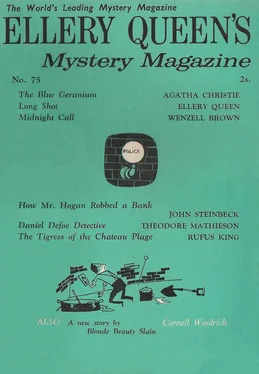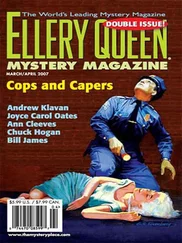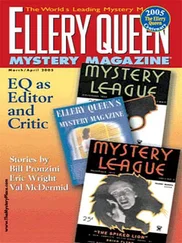Агата Кристи - Ellery Queen’s Mystery Magazine. No. 75, April 1959, British Edition
Здесь есть возможность читать онлайн «Агата Кристи - Ellery Queen’s Mystery Magazine. No. 75, April 1959, British Edition» весь текст электронной книги совершенно бесплатно (целиком полную версию без сокращений). В некоторых случаях можно слушать аудио, скачать через торрент в формате fb2 и присутствует краткое содержание. Город: London, Год выпуска: 1959, Издательство: Mellifont Press, Жанр: Детектив, на английском языке. Описание произведения, (предисловие) а так же отзывы посетителей доступны на портале библиотеки ЛибКат.
- Название:Ellery Queen’s Mystery Magazine. No. 75, April 1959, British Edition
- Автор:
- Издательство:Mellifont Press
- Жанр:
- Год:1959
- Город:London
- ISBN:нет данных
- Рейтинг книги:4 / 5. Голосов: 1
-
Избранное:Добавить в избранное
- Отзывы:
-
Ваша оценка:
- 80
- 1
- 2
- 3
- 4
- 5
Ellery Queen’s Mystery Magazine. No. 75, April 1959, British Edition: краткое содержание, описание и аннотация
Предлагаем к чтению аннотацию, описание, краткое содержание или предисловие (зависит от того, что написал сам автор книги «Ellery Queen’s Mystery Magazine. No. 75, April 1959, British Edition»). Если вы не нашли необходимую информацию о книге — напишите в комментариях, мы постараемся отыскать её.
Ellery Queen’s Mystery Magazine. No. 75, April 1959, British Edition — читать онлайн бесплатно полную книгу (весь текст) целиком
Ниже представлен текст книги, разбитый по страницам. Система сохранения места последней прочитанной страницы, позволяет с удобством читать онлайн бесплатно книгу «Ellery Queen’s Mystery Magazine. No. 75, April 1959, British Edition», без необходимости каждый раз заново искать на чём Вы остановились. Поставьте закладку, и сможете в любой момент перейти на страницу, на которой закончили чтение.
Интервал:
Закладка:
A little dictating — into a machine. A little phoning — here, there, around. From him, and more often, to him. Perhaps involving thousands and thousands of dollars — but you never would have guessed. Money was never even mentioned. The calls seemed to be mostly about golf, and the last country club dance, and the next country club dance, and how’s Evelyn, and June’s fine. And then an appointment for lunch would be set up, and after the lunch had come and gone, he’d be twenty thousand richer, or forty, or sixty, or more. Not at anyone’s expense. Certainly not at the client’s. The client went right along with him — twenty, forty, sixty. Not at the market’s, either. Because for everyone who sold, there was someone who bought. Just “the old grind.” Mystique.
By that time it would be 11:00 or 11:30, and he’d have Rico and Dotty up — Rico to trim his hair, Dotty to trim his nails. Not every day of course, about once in a week. Twice, if he and June had some big engagement on. It wouldn’t have occurred to him to go to a barber — the barber came to him. It was done just right — everything just right. Not too much talk — that would have been clownish; but not too little either — that would have been stiff and ungracious. Then they’d both leave, thanking him, and if he’d given them a little something more than the customary tip, which he did every now and then, he’d repeat his instructions, so they’d be sure to get them right.
“Now remember, buy at twenty, as I told you. Put the order in right away, so you’ll catch it on the fly first thing the market opens in the morning. But don’t hold on. Put in a ‘sell’ order at twenty-five and you’ll make a nice little profit. And, mind you this is just for you two. If you say a word to anyone, spread it around, it’s the last time I’ll ever—”
“I won’t even tell my own husband,” Dotty would vow.
“Good,” he’d say solemnly. “Because husbands have big mouths. I happen to be one myself, and I know.”
And by then it would be about time for whatever lunch date he had.
Today it was with Don Warren. Don Warren and Doug Elliott had been friends long before they became client and broker. In fact, they had been college classmates together. Don was waiting for him at their usual table, in their usual restaurant.
After he’d shaken hands with him and sat down, Elliott began to worry one fingernail with the corner of his mouth, moistening it and blowing his breath on it. “Dotty’s a very good manicurist, but this split goes down just below the cuticle. Even she couldn’t do anything with it. Except smooth it out a little.”
“How’d you come to do it?”
Elliott looked up at him disarmingly. “Strangling blondes,” he said with winning frankness.
Warren uttered the polite chuckle that friendship called for — but no more — then gave him a rueful look. “You’ve always had the weirdest sense of humor,” he complained.
Elliott strugged meekly. “I wasn’t trying to be funny,” he mumured, then opened up the large menu-folder with the concentration of a man whose efforts to be sprightly have not been an unqualified success, and who therefore turns resignedly to something else...
John Steinbeck
How Mr. Hogan Robbed a Bank
© 1956 by John Steinbeck; originally appeared in “The Atlantic Monthly”
A surprisingly full study of an American small town — much of it by implication — by the famous author of THE GRAPES OF WRATH and TORTILLA FLAT...
On the Saturday before Labor Day, 1955, at 9:04½ A.M., Mr. Hogan robbed a bank. He was forty-two years old, married, and the father of a boy and a girl, named John and Joan, twelve and thirteen respectively. Mrs. Hogan’s name was Joan and Mr. Hogan’s was John, but since they called themselves Papa and Mama, that left their names free for the children, who were considered very smart for their ages, each having jumped a grade in school. The Hogans lived at 215 East Maple Street, in a brown-shingle house with white trim — there are two. 215 is the one across from the street light and it is the one with the big tree in the yard, either oak or elm — the biggest tree in the whole street, maybe in the whole town. That’s pretty big.
John and Joan were in bed at the time of the robbery, for it was Saturday. At 9:10 A.M., Mrs. Hogan was making the cup of tea she always had. Mr. Hogan went to work early. Mrs. Hogan drank her tea slowly, scalding hot, and read her fortune in the tea leaves. There was a cloud and a five-pointed star with two short points in the bottom of the cup, but that was at 9:12 and the robbery was all over by then.
The way Mr. Hogan went about robbing the bank was very interesting. He gave it a great deal of thought and had for a long time, but he did not discuss it with anyone. He just read his newspaper and kept his own counsel. But he worked it out to his own satisfaction that people went to too much trouble robbing banks and that got them in a mess. The simpler the better, he always thought. People went in for too much hullabaloo and hanky-panky. If you didn’t do that, if you left hanky-panky out, robbing a bank would be a relatively sound venture — barring accidents, of course, of an improbable kind, but then they could happen to a man crossing the street or anything. Since Mr. Hogan’s method worked fine, it proved that his thinking was sound. He often considered writing a little booklet on his technique when the how-to rage was running so high. He figured out the first sentence, which went: “To successfully rob a bank, forget all about hanky-panky.”
Mr. Hogan was not just a clerk at Fettucci’s grocery store. He was more like the manager. Mr. Hogan was in charge, even hired and fired the boy who delivered groceries after school. He even put in orders with the salesmen, sometimes when Mr. Fettucci was right in the store too, maybe talking to a customer. “You do it, John,” he would say and he would nod at the customer, “John knows the ropes. Been with me — how long you been with me, John?”
“Sixteen years.”
“Sixteen years. Knows the business as good as me. John, why he even banks the money.”
And so he did. Whenever he had a moment, Mr. Hogan went into the storeroom on the alley, took off his apron, put on his necktie and coat, and went back through the store to the cash register. The checks and bills would be ready for him inside the bankbook with a rubber band around it. Then he went next door and stood at the teller’s window and handed the checks and bankbook through to Mr. Cup and passed the time of day with him too. Then, when the bankbook was handed back, he checked the entry, put the rubber band around it, and walked next door to Fettucci’s grocery and put the bankbook in the cash register, continued on to the storeroom, removed his coat and tie, put on his apron, and went back into the store ready for business. If there was no line at the teller’s window, the whole thing didn’t take more than five minutes, even passing the time of day.
Mr. Hogan was a man who noticed things, and when it came to robbing the bank, this trait stood him in good stead. He had noticed, for instance, where the big bills were kept right in the drawer under the counter and he had noticed also what days there were likely to be more than on other days. Thursday was payday at the American Can Company’s local plant, for instance, so there would be more then. Some Fridays people drew more money to tide them over the weekend. But it was even Steven, maybe not a thousand dollars difference, between Thursdays and Fridays and Saturday mornings. Saturdays were not terribly good because people didn’t come to get money that early in the morning, and the bank closed at noon. But he thought it over and came to the conclusion that the Saturday before a long weekend in the summer would be the best of all. People going on trips, vacations, people with relatives visiting, and the bank closed Monday. He thought it out and looked, and sure enough the Saturday morning before Labor Day the cash drawer had twice as much money in it — he saw it when Mr. Cup pulled out the drawer.
Читать дальшеИнтервал:
Закладка:
Похожие книги на «Ellery Queen’s Mystery Magazine. No. 75, April 1959, British Edition»
Представляем Вашему вниманию похожие книги на «Ellery Queen’s Mystery Magazine. No. 75, April 1959, British Edition» списком для выбора. Мы отобрали схожую по названию и смыслу литературу в надежде предоставить читателям больше вариантов отыскать новые, интересные, ещё непрочитанные произведения.
Обсуждение, отзывы о книге «Ellery Queen’s Mystery Magazine. No. 75, April 1959, British Edition» и просто собственные мнения читателей. Оставьте ваши комментарии, напишите, что Вы думаете о произведении, его смысле или главных героях. Укажите что конкретно понравилось, а что нет, и почему Вы так считаете.












